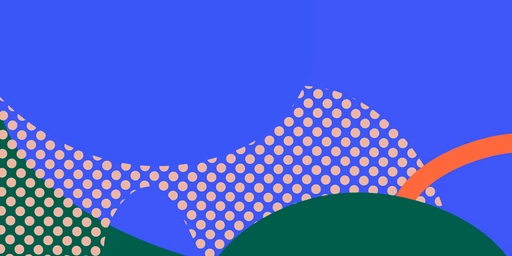
Learning Spaces
Time: 11:15-13:00
Location: Perron038
Language: English & Dutch
Thursday afternoon 30 November
Time: 14:15-16:30
Location: Perron038
Language: English
With:
Karolina Wargin (MEd & MA) is a freelance ArtistEducator working with art and cultural organisations and educational institutes. She employs Arts-Based Research methods to create collective spaces of care and creativity.
As a result of her Master of Education in Arts (iMAE+, ArtEZ) she started developing Embodied-Creative Learning method to holistically connect body knowledge, creative expression and critical thinking.
For Windesheim University (Zwolle, 2023), with a team of 5 ArtistEducators, she co-designed the two-month course, called “Responsible Leadership” for 40 students of International Business HBO.
For the fi rst edition of the Next Generation Festival (No University, Zwolle, 2022), she was invited to develop a workshop that tackled the climate crisis from an interdisciplinary and “embodied” perspective.
With the team of RE:PLACE (Honours Lab Radboud University, 2021-22), she co-developed an educational project about climate crisis awareness in higher education. The project was selected by the New European Bauhaus 2022 Brussels.
Sanne Arbouw (she/her) studied at the ArtEZ Arnhem at the theatre department. She is the co-founder and artistic director of Speels Collectief and guestteacher and intership guidance in ArtEZ Arnhem and works in different art academies in the Netherlands for dance and theatre at HKU and FHK. Sanne Arbouw
Photo: Dennis van Roozendaal
Tim Kroesbergen (he/him) is public speaker, disability lobbyist and advisor in healthcare technology. In the last years he joined as a guest dancer in projects of the dance department @ArtEZ and is a performer at Speels Collectief. He’s joining conversations with ArtEZ about how to improve their accessibility. Tim Kroesbergen
Photo: Michèle Giebing
Eric de Leeuw is educated as an (interior) architect (BA/ MSc) and is currently a tutor and head of the bachelor course IN_architecture and is core tutor artistic research of the master Corpo-real, both at ArtEZ University of the Arts.
After his studies, he started working at different architectural studios, such as Meccano Architects, in combination with a four-year master course in architecture at the Academie of Architecture, Amsterdam where he graduated cum laude in 1995. In 1997 he founded DAAD Architects together with three partners.
From 2002 he was approached to teach as a tutor at many different Universities; the Academies of Architecture in Amsterdam, Rotterdam, Arnhem and Groningen, the KULeuven, KADK Copenhagen, and more.
In 2005 he founded Atelier eric de leeuw (a e dl_) an interdisciplinary studio that has realised projects in almost every domain of spatial design. It invests in spatial research to enlarge the knowledge of the discipline. Since 1995 he has been practicing Martial Arts, which strengthened his knowledge of the relationship between body and space.
Johann Arens works with installation and video to survey how shared infrastructures impact our communal life and shape civil behaviour. These site-related installations take place in facets of the public domain; at community centres, schools, hospitals, digital learning centres, internet cafes, local markets as well as art spaces. The installations are tailored to be platforms to celebrate and mushroom forms of communality.
He has realised public art commissions with Arnolfini Bristol, Bold Tendencies London, Kettle’s Yard Cambridge and UCL Culture, and works since 2020 with researcher Dr. Hanna Baumann on the longterm project Another Provision. His work has recently been exhibited at Manifesta13 Marseille; Pump House Gallery London; IMMA Irish Museum of Modern Art Dublin; P/////AKT Amsterdam, IFFR Rotterdam and Neuer Aachener Kunstverein.
johannarens.com
anotherprovision.org
Irene Müller is a core lecturer in the In_architecture (BA) and Corpo-real (MA) courses at ArtEZ and the Master of Interior Architecture at the HKU. She is a spatial designer, creativity trainer and consultant for Economy for the Common Good, mainly in the field of public spaces, education / knowledge institutes, work environments, often at the intersection between (organizational) change and space. Trained as a product designer at the UdKBerlin, she uses a broad understanding of design: as 'Gestaltung' also of social and political interventions and ideals. She is interested in how post-property ideologies, distributive economics and new democratic practices are connected to space, design and art. In her work with students, she is curious about their ideals and how they perceive and increase their influence, and she guides students in developing their own research and methods and in developing future scenarios.
Programme Learning Space
What does the building of the future art school smell, taste and feel like? That question is becoming very concrete in Zwolle, now that there are plans for new ArtEZ buildings in the Spoorzone (‘Rail Zone’). ArtEZ is taking the development into its own hands, starting a collective process. The purpose-built temporary architectural firm, TAB50, will design and guide this process, and ultimately the construction of our own Future Art School.Today is your chance to have a say, whilst we are still at the beginning phases. What kind of buildings and learning spaces do we need? What experiences can they make possible for students, faculty and visitors? What new opportunities can we develop in the Spoorzone? What is actually the significance of an art academy in the city of Zwolle?
In the process you will get acquainted with different ways to really involve people in artistic and participatory processes. With the dreamed new building as an example, we practice with co-creative practices and methods to listen carefully to future users and other stakeholders, especially outside your own discipline and circle.
Go to the ArtEZ Studium Generale Agenda to register directly for Thursday morning or afternoon.
Register for Thursday morning
Register for Thursday afternoon
Die vraag wordt in Zwolle wel heel concreet, nu er plannen zijn voor nieuwe ArtEZ-gebouwen in de Spoorzone. ArtEZ neemt de ontwikkeling in eigen hand en start een collectief proces. Het speciaal voor dit doel opgerichte tijdelijke architectenbureau, TAB50, ontwerpt en begeleidt dit proces, en uiteindelijk ook de bouw van onze eigen Future Art School.
Vandaag is je kans om mee te praten, nu we nog aan het prille begin staan. Wat voor soort gebouwen en leerruimten hebben we nodig? Welke ervaringen maken zij mogelijk voor studenten, docenten en bezoekers? Welke nieuwe mogelijkheden kunnen we ontwikkelen in de Spoorzone? Wat is eigenlijk de betekenis van een kunstacademie in de stad Zwolle?
Al doende maak je kennis met verschillende manieren om mensen werkelijk te betrekken bij artistieke en participatieve processen. Met het gedroomde nieuwe gebouw als voorbeeld, oefenen we in de lijn Learning Spaces met methodes om goed te luisteren naar toekomstige gebruikers en andere belanghebbenden, vooral ook buiten je eigen discipline.
Donderdagochtend 30 november
Tijd: 11.15 - 13.00 uur
Locatie: Gebouw 50
Taal: English en Nederlands
Donderdagmiddag 30 november
Tijd: 14.15 - 16.30 uur
Locatie: Perron038
Taal: English
Ga naar de ArtEZ Studium Generale Agenda om je direct in te schrijven voor donderdagochtend of donderdagmiddag.
Aanmelden donderdagochtend
Aanmelden donderdagmiddag
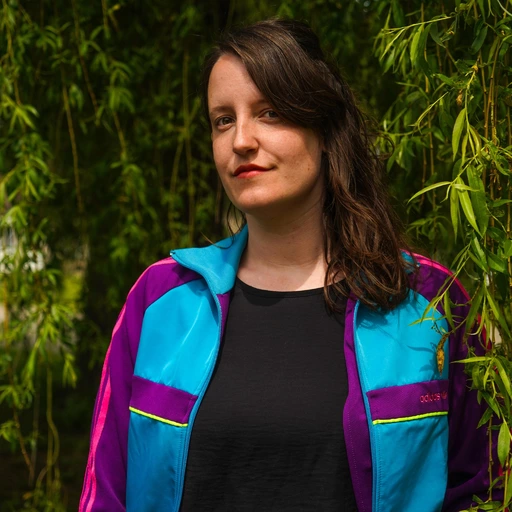
Sanne Arbouw
Sanne Arbouw (she/her) studied at the ArtEZ Arnhem at the theatre department. She is the co-founder and artistic director of Speels Collectief and guestteacher and intership guidance in ArtEZ Arnhem and works in different art academies in the Netherlands for dance and theatre at HKU and FHK. Sanne Arbouw
Photo: Dennis van Roozendaal
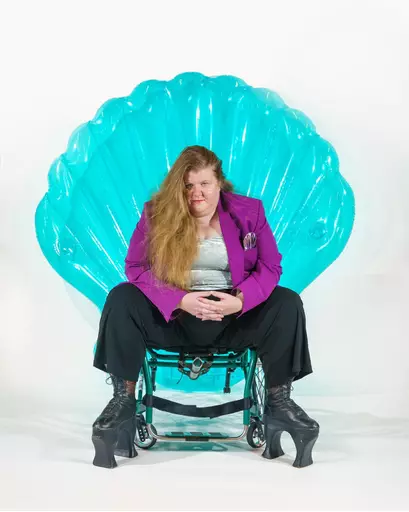
Marloes Dingshoff
Marloes Dingshoff (she/her) is a actress and workshop teacher at Speels Collectief. Besides her work at Speels Collectief she is a performer and director at different companies (Het Houten Huis, Plan D) Marloes Dingshoff
Photo: William van der Voort
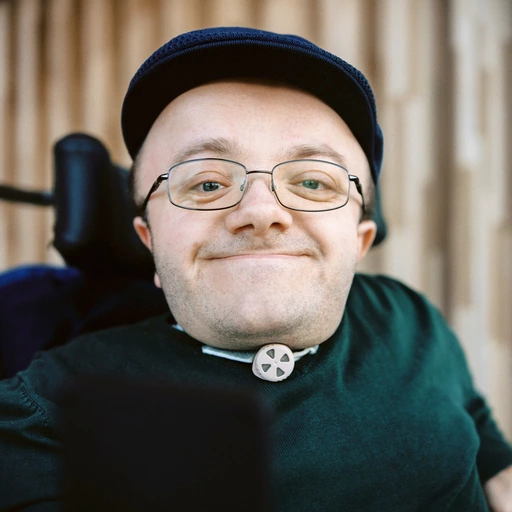
Tim Kroesbergen
Tim Kroesbergen (he/him) is public speaker, disability lobbyist and advisor in healthcare technology. In the last years he joined as a guest dancer in projects of the dance department @ArtEZ and is a performer at Speels Collectief. He’s joining conversations with ArtEZ about how to improve their accessibility. Tim Kroesbergen
Photo: Michèle Giebing
by
Sanne Arbouw (she/her) studied at the ArtEZ Arnhem at the theatre department. She is the co-founder and artistic director of Speels Collectief and guestteacher and intership guidance in ArtEZ Arnhem and works in different art academies in the Netherlands for dance and theatre at HKU and FHK. Sanne Arbouw
Photo: Dennis van Roozendaal
Tim Kroesbergen (he/him) is public speaker, disability lobbyist and advisor in healthcare technology. In the last years he joined as a guest dancer in projects of the dance department @ArtEZ and is a performer at Speels Collectief. He’s joining conversations with ArtEZ about how to improve their accessibility. Tim Kroesbergen
Photo: Michèle Giebing
Thursday morning 30 November
Time: 11:00-13:00
Location: Perron038
How do we envision an accesible art school in the buildings of ArtEZ? An accessible art school is not only for the crip and disabled community, it concerns everyone and all the intersections matter. We start our workshop with exploring your own access needs for your ideal future art school and make you aware about those. We share some knowledge about terminology from the disabled community; crip, criptime, social and medical model and ableism. With interactive exercises we challenge the participants to envision and design their future art school in the workshop space.
How can people thrive in an accessible art school and what would it look like for you as an individual in your context? After sharing those visions we question if we still miss some perspectives, as this of course depends on the diversity of our participants. We wonder if it’s even possible to design an accessible art school that’s inclusive for everyone. Or will someone’s access need in a certain way exclude another one’s access need? The last question we would like to drop is how we can already start with small suggestions to make a radical accessible art school within the structure, the building and system we’re in right now.
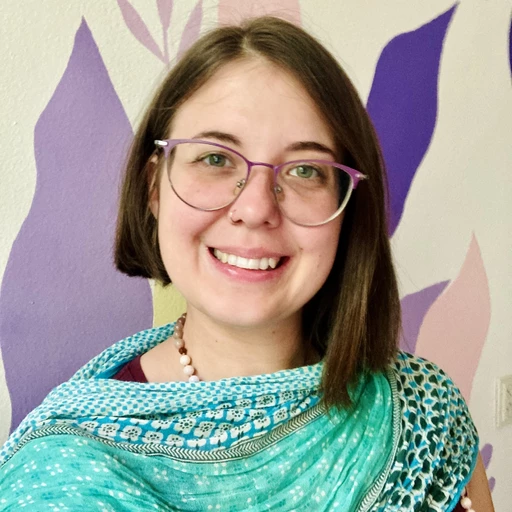
Karolina Wargin
Karolina Wargin (MEd & MA) is a freelance ArtistEducator working with art and cultural organisations and educational institutes. She employs Arts-Based Research methods to create collective spaces of care and creativity.
As a result of her Master of Education in Arts (iMAE+, ArtEZ) she started developing Embodied-Creative Learning method to holistically connect body knowledge, creative expression and critical thinking.
For Windesheim University (Zwolle, 2023), with a team of 5 ArtistEducators, she co-designed the two-month course, called “Responsible Leadership” for 40 students of International Business HBO.
For the fi rst edition of the Next Generation Festival (No University, Zwolle, 2022), she was invited to develop a workshop that tackled the climate crisis from an interdisciplinary and “embodied” perspective.
With the team of RE:PLACE (Honours Lab Radboud University, 2021-22), she co-developed an educational project about climate crisis awareness in higher education. The project was selected by the New European Bauhaus 2022 Brussels.
by
Karolina Wargin (MEd & MA) is a freelance ArtistEducator working with art and cultural organisations and educational institutes. She employs Arts-Based Research methods to create collective spaces of care and creativity.
As a result of her Master of Education in Arts (iMAE+, ArtEZ) she started developing Embodied-Creative Learning method to holistically connect body knowledge, creative expression and critical thinking.
For Windesheim University (Zwolle, 2023), with a team of 5 ArtistEducators, she co-designed the two-month course, called “Responsible Leadership” for 40 students of International Business HBO.
For the fi rst edition of the Next Generation Festival (No University, Zwolle, 2022), she was invited to develop a workshop that tackled the climate crisis from an interdisciplinary and “embodied” perspective.
With the team of RE:PLACE (Honours Lab Radboud University, 2021-22), she co-developed an educational project about climate crisis awareness in higher education. The project was selected by the New European Bauhaus 2022 Brussels.
Thursday morning 30 November
Time: 11:00-13:00
Location: Perron038
We live in fight-or-flight mode. This lifestyle permeates every context - family, work, school, social life - and our stress levels keep rising. On the same level, many educational settings require students to maintain high concentration levels while sitting still or when they are asked to complete assignments quickly. By pushing this responsiveness and “always-active mode”, we often forget to create time and space to feel, explore, or simply breathe.
By allowing deeper connections to our bodies, how could the educational setting change?
For almost a hundred years, somatic educators have been studying the eff ects on the body-mind connection, along with the positive impact of mindful movement. For instance, they noticed a signifi cant “increase in energy or a wave of feelings and ideas supporting creativity” in their participants (Eddy, 2017). More recently, embodied critical pedagogy studies (Johnson, 2018; Shapiro, 1999) have explored the value of the embodied perspective in educational settings. They fi nd it valuable for stimulating critical thinking and more horizontal learning environments.
By taking deep inspiration from somatic education end embodied critical pedagogy,
Karolina Wargin (MEd & MA) is a freelance ArtistEducator working with art and cultural organisations and educational institutes. She employs Arts-Based Research methods to create collective spaces of care and creativity.
As a result of her Master of Education in Arts (iMAE+, ArtEZ) she started developing Embodied-Creative Learning method to holistically connect body knowledge, creative expression and critical thinking.
For Windesheim University (Zwolle, 2023), with a team of 5 ArtistEducators, she co-designed the two-month course, called “Responsible Leadership” for 40 students of International Business HBO.
For the fi rst edition of the Next Generation Festival (No University, Zwolle, 2022), she was invited to develop a workshop that tackled the climate crisis from an interdisciplinary and “embodied” perspective.
With the team of RE:PLACE (Honours Lab Radboud University, 2021-22), she co-developed an educational project about climate crisis awareness in higher education. The project was selected by the New European Bauhaus 2022 Brussels.
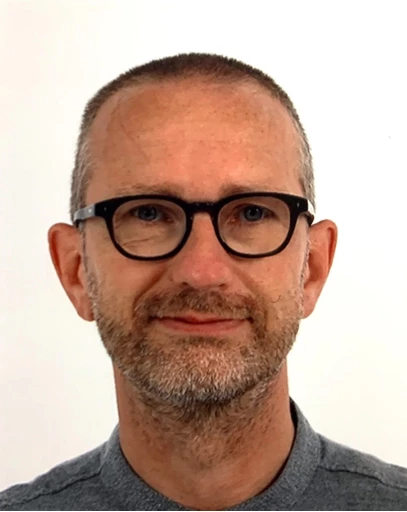
Eric de Leeuw
Eric de Leeuw is educated as an (interior) architect (BA/ MSc) and is currently a tutor and head of the bachelor course IN_architecture and is core tutor artistic research of the master Corpo-real, both at ArtEZ University of the Arts.
After his studies, he started working at different architectural studios, such as Meccano Architects, in combination with a four-year master course in architecture at the Academie of Architecture, Amsterdam where he graduated cum laude in 1995. In 1997 he founded DAAD Architects together with three partners.
From 2002 he was approached to teach as a tutor at many different Universities; the Academies of Architecture in Amsterdam, Rotterdam, Arnhem and Groningen, the KULeuven, KADK Copenhagen, and more.
In 2005 he founded Atelier eric de leeuw (a e dl_) an interdisciplinary studio that has realised projects in almost every domain of spatial design. It invests in spatial research to enlarge the knowledge of the discipline. Since 1995 he has been practicing Martial Arts, which strengthened his knowledge of the relationship between body and space.
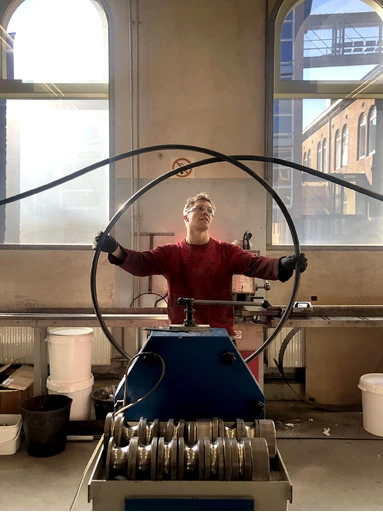
Johann Arens
Johann Arens works with installation and video to survey how shared infrastructures impact our communal life and shape civil behaviour. These site-related installations take place in facets of the public domain; at community centres, schools, hospitals, digital learning centres, internet cafes, local markets as well as art spaces. The installations are tailored to be platforms to celebrate and mushroom forms of communality.
He has realised public art commissions with Arnolfini Bristol, Bold Tendencies London, Kettle’s Yard Cambridge and UCL Culture, and works since 2020 with researcher Dr. Hanna Baumann on the longterm project Another Provision. His work has recently been exhibited at Manifesta13 Marseille; Pump House Gallery London; IMMA Irish Museum of Modern Art Dublin; P/////AKT Amsterdam, IFFR Rotterdam and Neuer Aachener Kunstverein.
johannarens.com
anotherprovision.org
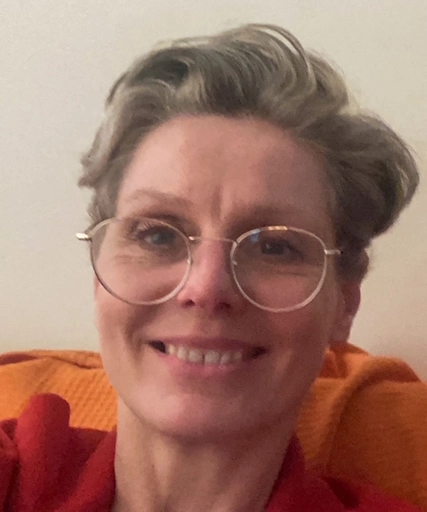
Irene Müller
Irene Müller is a core lecturer in the In_architecture (BA) and Corpo-real (MA) courses at ArtEZ and the Master of Interior Architecture at the HKU. She is a spatial designer, creativity trainer and consultant for Economy for the Common Good, mainly in the field of public spaces, education / knowledge institutes, work environments, often at the intersection between (organizational) change and space. Trained as a product designer at the UdKBerlin, she uses a broad understanding of design: as 'Gestaltung' also of social and political interventions and ideals. She is interested in how post-property ideologies, distributive economics and new democratic practices are connected to space, design and art. In her work with students, she is curious about their ideals and how they perceive and increase their influence, and she guides students in developing their own research and methods and in developing future scenarios.
by
Eric de Leeuw is educated as an (interior) architect (BA/ MSc) and is currently a tutor and head of the bachelor course IN_architecture and is core tutor artistic research of the master Corpo-real, both at ArtEZ University of the Arts.
After his studies, he started working at different architectural studios, such as Meccano Architects, in combination with a four-year master course in architecture at the Academie of Architecture, Amsterdam where he graduated cum laude in 1995. In 1997 he founded DAAD Architects together with three partners.
From 2002 he was approached to teach as a tutor at many different Universities; the Academies of Architecture in Amsterdam, Rotterdam, Arnhem and Groningen, the KULeuven, KADK Copenhagen, and more.
In 2005 he founded Atelier eric de leeuw (a e dl_) an interdisciplinary studio that has realised projects in almost every domain of spatial design. It invests in spatial research to enlarge the knowledge of the discipline. Since 1995 he has been practicing Martial Arts, which strengthened his knowledge of the relationship between body and space.
Johann Arens works with installation and video to survey how shared infrastructures impact our communal life and shape civil behaviour. These site-related installations take place in facets of the public domain; at community centres, schools, hospitals, digital learning centres, internet cafes, local markets as well as art spaces. The installations are tailored to be platforms to celebrate and mushroom forms of communality.
He has realised public art commissions with Arnolfini Bristol, Bold Tendencies London, Kettle’s Yard Cambridge and UCL Culture, and works since 2020 with researcher Dr. Hanna Baumann on the longterm project Another Provision. His work has recently been exhibited at Manifesta13 Marseille; Pump House Gallery London; IMMA Irish Museum of Modern Art Dublin; P/////AKT Amsterdam, IFFR Rotterdam and Neuer Aachener Kunstverein.
johannarens.com
anotherprovision.org
Irene Müller is a core lecturer in the In_architecture (BA) and Corpo-real (MA) courses at ArtEZ and the Master of Interior Architecture at the HKU. She is a spatial designer, creativity trainer and consultant for Economy for the Common Good, mainly in the field of public spaces, education / knowledge institutes, work environments, often at the intersection between (organizational) change and space. Trained as a product designer at the UdKBerlin, she uses a broad understanding of design: as 'Gestaltung' also of social and political interventions and ideals. She is interested in how post-property ideologies, distributive economics and new democratic practices are connected to space, design and art. In her work with students, she is curious about their ideals and how they perceive and increase their influence, and she guides students in developing their own research and methods and in developing future scenarios.
Thursday afternoon 30 November
Time: 14:15-16:30
Location: Perron038
Eric de Leeuw is educated as an (interior) architect (BA/ MSc) and is currently a tutor and head of the bachelor course IN_architecture and is core tutor artistic research of the master Corpo-real, both at ArtEZ University of the Arts.
After his studies, he started working at different architectural studios, such as Meccano Architects, in combination with a four-year master course in architecture at the Academie of Architecture, Amsterdam where he graduated cum laude in 1995. In 1997 he founded DAAD Architects together with three partners.
From 2002 he was approached to teach as a tutor at many different Universities; the Academies of Architecture in Amsterdam, Rotterdam, Arnhem and Groningen, the KULeuven, KADK Copenhagen, and more.
In 2005 he founded Atelier eric de leeuw (a e dl_) an interdisciplinary studio that has realised projects in almost every domain of spatial design. It invests in spatial research to enlarge the knowledge of the discipline. Since 1995 he has been practicing Martial Arts, which strengthened his knowledge of the relationship between body and space.
Eric de Leeuw is educated as an (interior) architect (BA/ MSc) and is currently a tutor and head of the bachelor course IN_architecture and is core tutor artistic research of the master Corpo-real, both at ArtEZ University of the Arts.
After his studies, he started working at different architectural studios, such as Meccano Architects, in combination with a four-year master course in architecture at the Academie of Architecture, Amsterdam where he graduated cum laude in 1995. In 1997 he founded DAAD Architects together with three partners.
From 2002 he was approached to teach as a tutor at many different Universities; the Academies of Architecture in Amsterdam, Rotterdam, Arnhem and Groningen, the KULeuven, KADK Copenhagen, and more.
In 2005 he founded Atelier eric de leeuw (a e dl_) an interdisciplinary studio that has realised projects in almost every domain of spatial design. It invests in spatial research to enlarge the knowledge of the discipline. Since 1995 he has been practicing Martial Arts, which strengthened his knowledge of the relationship between body and space.
Then artist and educator
Johann Arens works with installation and video to survey how shared infrastructures impact our communal life and shape civil behaviour. These site-related installations take place in facets of the public domain; at community centres, schools, hospitals, digital learning centres, internet cafes, local markets as well as art spaces. The installations are tailored to be platforms to celebrate and mushroom forms of communality.
He has realised public art commissions with Arnolfini Bristol, Bold Tendencies London, Kettle’s Yard Cambridge and UCL Culture, and works since 2020 with researcher Dr. Hanna Baumann on the longterm project Another Provision. His work has recently been exhibited at Manifesta13 Marseille; Pump House Gallery London; IMMA Irish Museum of Modern Art Dublin; P/////AKT Amsterdam, IFFR Rotterdam and Neuer Aachener Kunstverein.
johannarens.com
anotherprovision.org
Together we will be developing extra-disciplinary methodologies to help students situating their practices right in the centre of communities in Zwolle. The workshop activities will help to shape a focused awareness of one’s choices and their impact on the immediate surroundings. As such, those partaking will be asked to make observations on social life, to listen to their audiences and they will be encouraged to rethink their own practise in dialogue with the public.
Irene Müller is a core lecturer in the In_architecture (BA) and Corpo-real (MA) courses at ArtEZ and the Master of Interior Architecture at the HKU. She is a spatial designer, creativity trainer and consultant for Economy for the Common Good, mainly in the field of public spaces, education / knowledge institutes, work environments, often at the intersection between (organizational) change and space. Trained as a product designer at the UdKBerlin, she uses a broad understanding of design: as 'Gestaltung' also of social and political interventions and ideals. She is interested in how post-property ideologies, distributive economics and new democratic practices are connected to space, design and art. In her work with students, she is curious about their ideals and how they perceive and increase their influence, and she guides students in developing their own research and methods and in developing future scenarios.